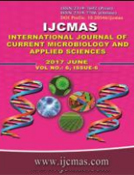


 National Academy of Agricultural Sciences (NAAS)
National Academy of Agricultural Sciences (NAAS)

|
PRINT ISSN : 2319-7692
Online ISSN : 2319-7706 Issues : 12 per year Publisher : Excellent Publishers Email : editorijcmas@gmail.com / submit@ijcmas.com Editor-in-chief: Dr.M.Prakash Index Copernicus ICV 2018: 95.39 NAAS RATING 2020: 5.38 |
The newly developed cellulolytic microbial consortium was evaluated for its composting efficiency on rural and urban waste in open pit method. During composting highest temperature was recorded in second week in both the rural and urban waste compost pits. The temperature declined gradually thereafter in all the treatments upto 11th week and remained almost stable thereafter. The bacterial and fungal population in composting pits increased gradually and highest population was recorded in initial phase of composting i.e. between 60 to 90 days of composting in test consortium and commercial consortium treated pits, while in uninoculated control pits it took 90 to 120 days for reaching to its maximum. Thereafter a gradual decrease in bacterial and fungal population and increase in actinomycetes population was recorded. The population of actinomycetes was found at peak between 120 and 150 days of composting period. Test consortium reduced the composting period of rural waste by 22.68% while that of urban waste by 18.39% over uninoculated control. The treatment with test consortium on both wastes recorded numerically higher mineral content over commercial consortium and uninoculated control. Results indicated that the use of test consortium reduced the overall time required for composting besides producing the nutrient enriched compost product.
 |
 |
 |
 |
 |